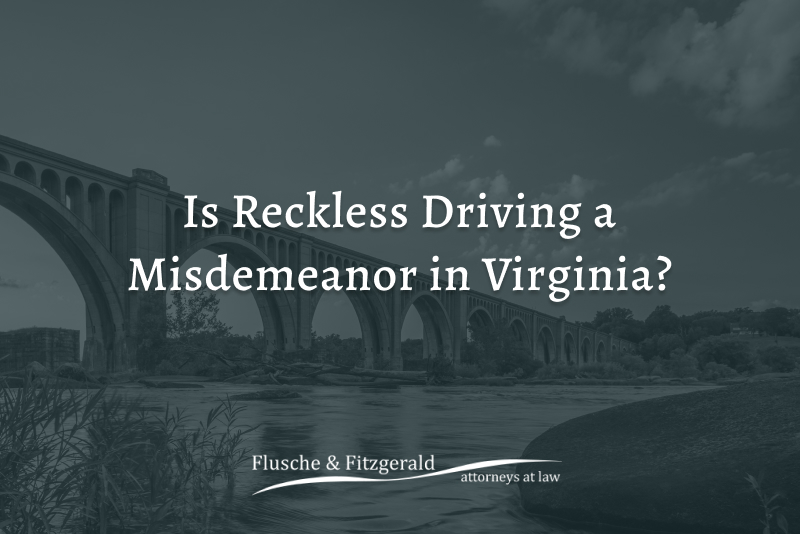
You were driving home after a long day, running a few minutes late. The road was open, your mind was on dinner plans, and before you knew it, the flashing blue lights were behind you. The officer says he clocked you at 87 mph in a 70 mph zone. You figure it’s just a speeding ticket until the words “reckless driving” come out of the officer’s mouth. That’s when it hits you: this is not a simple traffic citation. It’s actually treated as a criminal offense under Virginia law. Now you’re wondering: is reckless driving a misdemeanor?
Reckless driving is a crime in Virginia. Most reckless driving charges are Class 1 misdemeanors, the highest level of misdemeanor in the state. Below, we explain what that means, how it can affect your life, and what you can do next.
How Virginia Defines Reckless Driving
Virginia law lists multiple behaviors that qualify as reckless driving, from excessive speed to unsafe driving that endangers life, limb, or property. The following are common scenarios that can lead to a reckless driving charge:
- Excessive speeding—20 mph over the posted limit, or over 85 mph regardless of the limit;
- Passing in prohibited areas—such as a curve near rural Route 3 at night or hills where visibility is limited;
- Driving too fast for road or weather conditions—even if you’re under the posted speed limit; and
- Street racing—competing with another driver on public roads.
While these examples vary, they share one thing: each can be treated as a criminal offense with serious consequences.
Is Reckless Driving a Misdemeanor in Virginia?
In Virginia, reckless driving is generally categorized as a Class 1 misdemeanor. This categorization makes it similar to serious crimes like DUI and assault, and if you’re convicted, you could face significant penalties, including possible jail time. Unlike a traffic ticket, a misdemeanor charge cannot be resolved by just paying a fine and moving on. You either must appear in court, or you might be able to hire an attorney to appear for you. Additionally, if reckless driving leads to the death of another person and the driver is unlicensed, the offense can be elevated to a Class 6 felony with much more significant penalties
Penalties for Class 1 Misdemeanor in Virginia for Reckless Driving
A reckless driving conviction carries more than just a fine as punishment. The law allows for criminal, financial, and administrative (through the DMV) consequences. If convicted, you could face:
- Up to 12 months in jail, even for first-time offenders;
- A fine of up to $2,500 plus court costs;
- Six DMV demerit points that can remain on your record for 11 years; and / or
- Driver’s license suspension for up to 6 months, which may affect your ability to work.
Judges normally consider driving speed, specific circumstances, and your prior record when determining punishments. A reckless driving conviction can have significant, long-lasting consequences that go far beyond an immediate fine.
The Unseen Ripple Effects
A reckless driving conviction can follow you long after you’ve paid fines or served jail time in the following ways:
- Higher auto insurance rates or even loss of coverage;
- Employment issues, especially if your job involves driving; and
- A criminal record that can impact housing, licensing, and security clearances.
The combination of criminal and administrative penalties makes fighting a reckless driving charge critical.
Possible Defenses and Next Steps
Common strategies for defense depend upon the facts of your case and may include the following:
- Questioning the speed measurement—errors with radar, LIDAR, or pacing can lead to incorrect readings;
- Proving an emergency—showing you had a life or death situation that explains your driving behavior;
- Showing a lack of endangerment—arguing that the driving did not meet the legal threshold for reckless driving; and
- Challenging the officer’s observations—citing erroneous police observations can help in cases where speed isn’t the primary factor.
Even if the charge cannot be dismissed, the prosecutor or judge might agree to reduce it to a non-criminal traffic infraction like improper driving, which carries no jail time and fewer long-term consequences.
Why Choose Flusche & Fitzgerald for Your Defense
At Flusche & Fitzgerald, defending misdemeanor reckless driving and other criminal charges isn’t just part of our work; it’s a core focus. Our reputation in Virginia courts is built on strategic case preparation, respectful but firm advocacy, and strong working relationships with local judges and prosecutors. We’ve helped many clients avoid criminal convictions and protect their driving privileges.
A reckless driving charge is a serious matter with lasting consequences. The sooner you act, the more options you have for protecting your record, license, and future opportunities. Talk to an attorney who understands the law, the local courts, and the defenses that work.
FAQs
Is Reckless Driving Considered a Misdemeanor in Virginia?
Yes. Most reckless driving charges are classified as Class 1 misdemeanors, punishable by up to 12 months in jail, a $2,500 fine, and a criminal record.
What’s the Difference Between a Misdemeanor and Felony Reckless Driving Charge in Virginia?
Misdemeanor reckless driving is the usual charge. However, it escalates to a Class 6 felony if it results in a fatality while driving without a valid license.
What Class of Misdemeanor Is Reckless Driving in Virginia?
Reckless driving is a Class 1 misdemeanor in Virginia, the highest misdemeanor level under state law.
Resources

